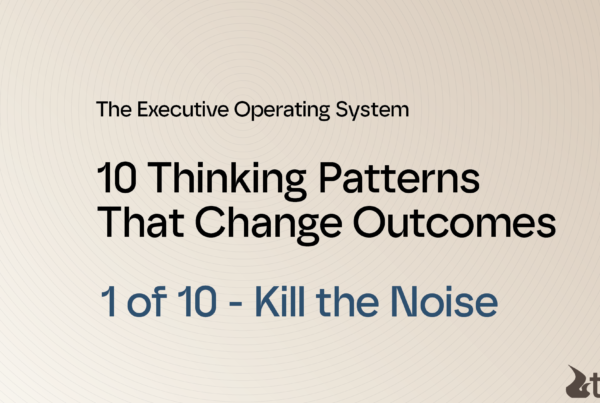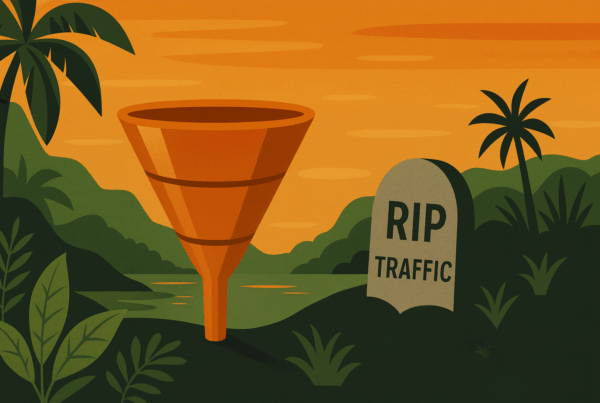Key takeaways:
- AI isn’t replacing marketers. It’s reshaping our roles by automating execution, not interpretation.
- Tasks rooted in creativity, empathy, and judgment remain hardest to automate.
- These “computerization bottlenecks” are where human marketers still outperform machines.
- The future belongs to marketers who know what to automate and what to protect.
Back in grad school, I wrote a paper on the potential impacts of AI on the labor market. I was studying Industrial Relations, curious about how technology might reshape not just which jobs exist, but how the work itself gets done.
This was 2021, before ChatGPT went mainstream. AI felt distant.
Now it’s not. Fast forward to 2025: I’m in marketing, working with AI tools every day. I decided to revisit some core themes from that research, reframed through the lens of modern marketing work.
One was Computerization Bottlenecks—the limits of automation, and the human skills in marketing that are worth protecting at all costs.
What Are Computerization Bottlenecks?
Computerization bottlenecks refer to types of work that resist automation, not because the tech isn’t capable, but because the tasks are deeply human.
They fall into three groups:
- Creative Intelligence – Inventing, adapting, and connecting abstract ideas. Think timing, tone, and originality.
- Social Intelligence – Reading tone, navigating ambiguity, influencing decisions. Think persuasion and emotional awareness, these are areas where AI still struggles.
- Perception + Manipulation – Physical adaptability and motor control. Less relevant in marketing – until you’re building a booth at 2 a.m.
Creative and social intelligence power interpretation, not execution. They’re context-dependent, hard to codify, and even harder to outsource.
And in marketing, that makes them essential…
The Work AI Already Took
One of the most enduring takeaways from this research was that AI will reshape jobs.
Economists call it job transformation. And back in 2020, it was estimated that 40–50% of U.S. and Canadian workers were at risk of having their roles significantly altered by automation.
For marketers, this shift is already happening. It starts at the task level. The first tasks to go are those that are clear, repetitive, and predictive. AI can already handle much of what used to eat up an entire day:
- Spinning up first drafts of blogs, emails, captions, and briefs
- Repurposing content across channels (turning a webinar into 12 posts, a recap, and a lead magnet)
- Auto-tagging images and creative assets by theme, format, and intent
- Generating performance dashboards from UTM parameters and campaign data
- Suggesting A/B test variants for subject lines or hero copy
These tasks aren’t disappearing. Jobs are being transformed.
AI handles the grunt work (execution) but you decide what’s worth keeping, what needs rewriting, and what’s missing entirely (interpretation).
What isn’t getting automated?
- Choosing the message that actually lands with this audience, right now
- Framing a campaign to align with brand strategy and business goals
- Reading between the lines of stakeholder feedback or client tone
- Knowing which version isn’t just correct, but compelling
The more your work leans on interpretation over execution, the harder it is to replace.
That shift is already here.
Lets Compare
ChatGPT says:“Unlock the Future of Marketing.”
You say:“Your Growth Playbook Just Got Smarter.”
ChatGPT says: “Thank you for your inquiry.”
You say: “Glad this caught your eye. What stood out to you?”
Same intention. Different impact. That’s interpretation.
Final Thoughts
The research is clear: the tasks least likely to be automated are the ones rooted in creativity, empathy, persuasion, and contextual judgment.
In marketing, that’s the difference between:
- Crafting a brand architecture vs. filling in a content calendar
- Shaping a messaging strategy vs. rewriting a meta description
- Leading a campaign concept vs. plugging CTAs into a prebuilt template
While AI is brilliant at execution, interpretation is still on us.
The marketers who thrive won’t be the ones doing it all manually, or blindly automating everything. They’ll be the ones who relentlessly use AI for speed, while fiercely protecting the tasks that demand judgment, taste, and nuance.
And when it matters most, they’ll know how to say:
This needs a human.




